Accounting 499 - University Report: Litigation, Censures, and Fines
VerifiedAdded on 2020/03/01
|5
|1073
|39
Report
AI Summary
This report examines a disciplinary action taken by the Public Company Accounting Oversight Board (PCAOB) against Ernst and Young LLP, imposing a $2 million penalty due to violations of PCAOB rules and regulations during the audit of Medicis Pharmaceutical Corporation. The report highlights failures in maintaining accounting ethics, non-compliance with U.S. Generally Accepted Accounting Principles (GAAP), and inadequate evaluation of financial transactions. It details the board's investigation, findings of audit standard violations, and the censure and fines imposed on the firm's partners. The report emphasizes the need for regular audits, stricter rules, and careful monitoring of accounting practices to prevent future violations, referencing Rule 102(e) of the Commission's rule of practice and the importance of imposing heavy penalties to deter non-compliance.
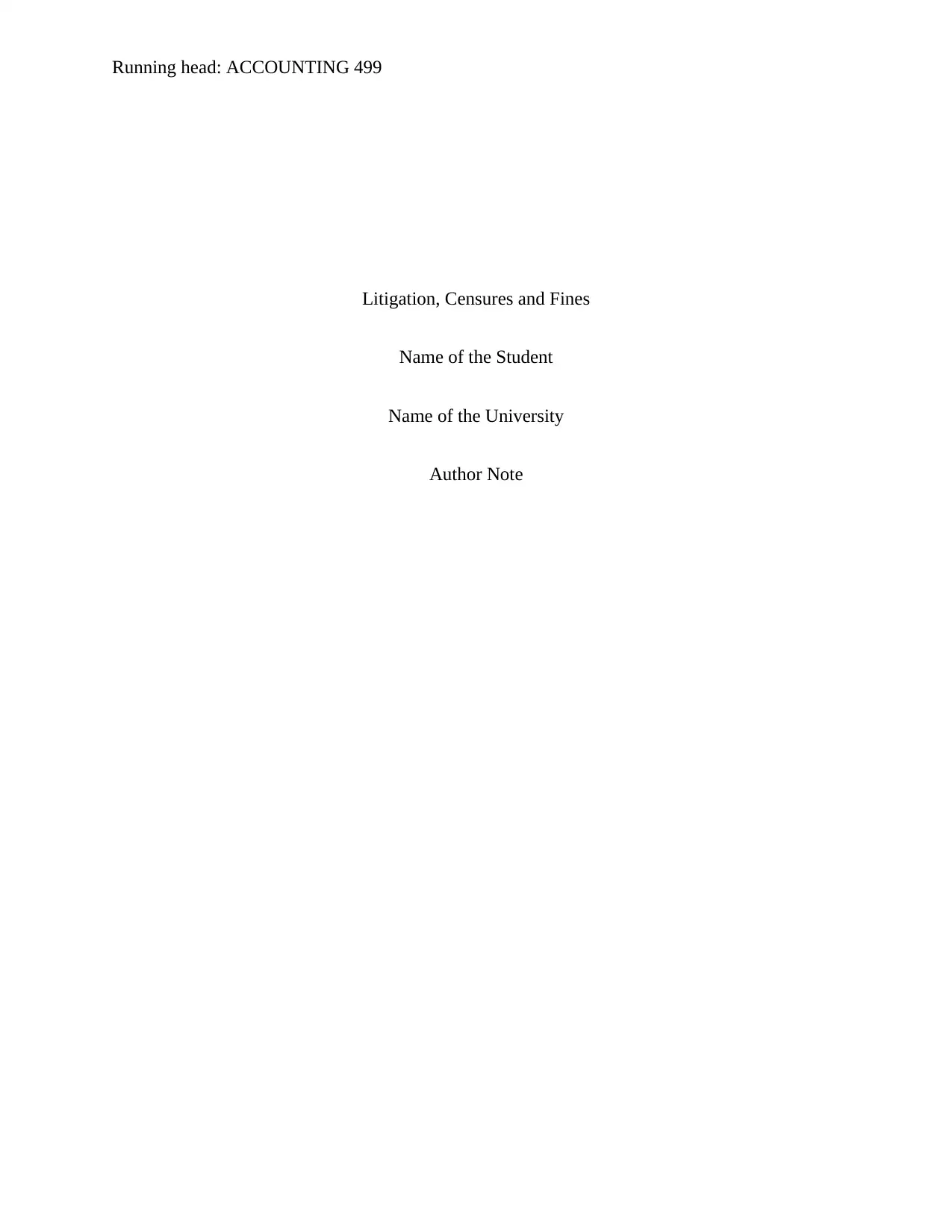
Running head: ACCOUNTING 499
Litigation, Censures and Fines
Name of the Student
Name of the University
Author Note
Litigation, Censures and Fines
Name of the Student
Name of the University
Author Note
Paraphrase This Document
Need a fresh take? Get an instant paraphrase of this document with our AI Paraphraser
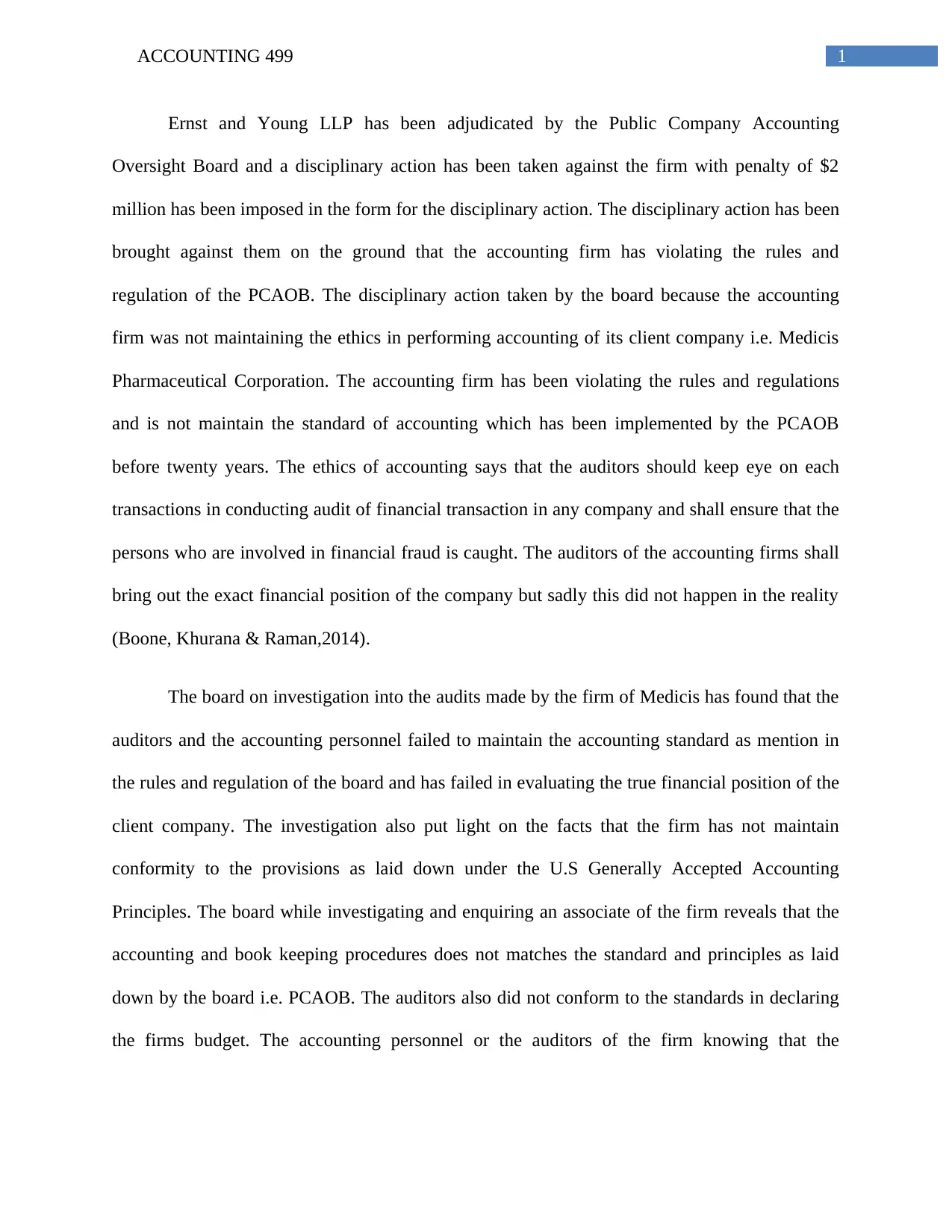
1ACCOUNTING 499
Ernst and Young LLP has been adjudicated by the Public Company Accounting
Oversight Board and a disciplinary action has been taken against the firm with penalty of $2
million has been imposed in the form for the disciplinary action. The disciplinary action has been
brought against them on the ground that the accounting firm has violating the rules and
regulation of the PCAOB. The disciplinary action taken by the board because the accounting
firm was not maintaining the ethics in performing accounting of its client company i.e. Medicis
Pharmaceutical Corporation. The accounting firm has been violating the rules and regulations
and is not maintain the standard of accounting which has been implemented by the PCAOB
before twenty years. The ethics of accounting says that the auditors should keep eye on each
transactions in conducting audit of financial transaction in any company and shall ensure that the
persons who are involved in financial fraud is caught. The auditors of the accounting firms shall
bring out the exact financial position of the company but sadly this did not happen in the reality
(Boone, Khurana & Raman,2014).
The board on investigation into the audits made by the firm of Medicis has found that the
auditors and the accounting personnel failed to maintain the accounting standard as mention in
the rules and regulation of the board and has failed in evaluating the true financial position of the
client company. The investigation also put light on the facts that the firm has not maintain
conformity to the provisions as laid down under the U.S Generally Accepted Accounting
Principles. The board while investigating and enquiring an associate of the firm reveals that the
accounting and book keeping procedures does not matches the standard and principles as laid
down by the board i.e. PCAOB. The auditors also did not conform to the standards in declaring
the firms budget. The accounting personnel or the auditors of the firm knowing that the
Ernst and Young LLP has been adjudicated by the Public Company Accounting
Oversight Board and a disciplinary action has been taken against the firm with penalty of $2
million has been imposed in the form for the disciplinary action. The disciplinary action has been
brought against them on the ground that the accounting firm has violating the rules and
regulation of the PCAOB. The disciplinary action taken by the board because the accounting
firm was not maintaining the ethics in performing accounting of its client company i.e. Medicis
Pharmaceutical Corporation. The accounting firm has been violating the rules and regulations
and is not maintain the standard of accounting which has been implemented by the PCAOB
before twenty years. The ethics of accounting says that the auditors should keep eye on each
transactions in conducting audit of financial transaction in any company and shall ensure that the
persons who are involved in financial fraud is caught. The auditors of the accounting firms shall
bring out the exact financial position of the company but sadly this did not happen in the reality
(Boone, Khurana & Raman,2014).
The board on investigation into the audits made by the firm of Medicis has found that the
auditors and the accounting personnel failed to maintain the accounting standard as mention in
the rules and regulation of the board and has failed in evaluating the true financial position of the
client company. The investigation also put light on the facts that the firm has not maintain
conformity to the provisions as laid down under the U.S Generally Accepted Accounting
Principles. The board while investigating and enquiring an associate of the firm reveals that the
accounting and book keeping procedures does not matches the standard and principles as laid
down by the board i.e. PCAOB. The auditors also did not conform to the standards in declaring
the firms budget. The accounting personnel or the auditors of the firm knowing that the
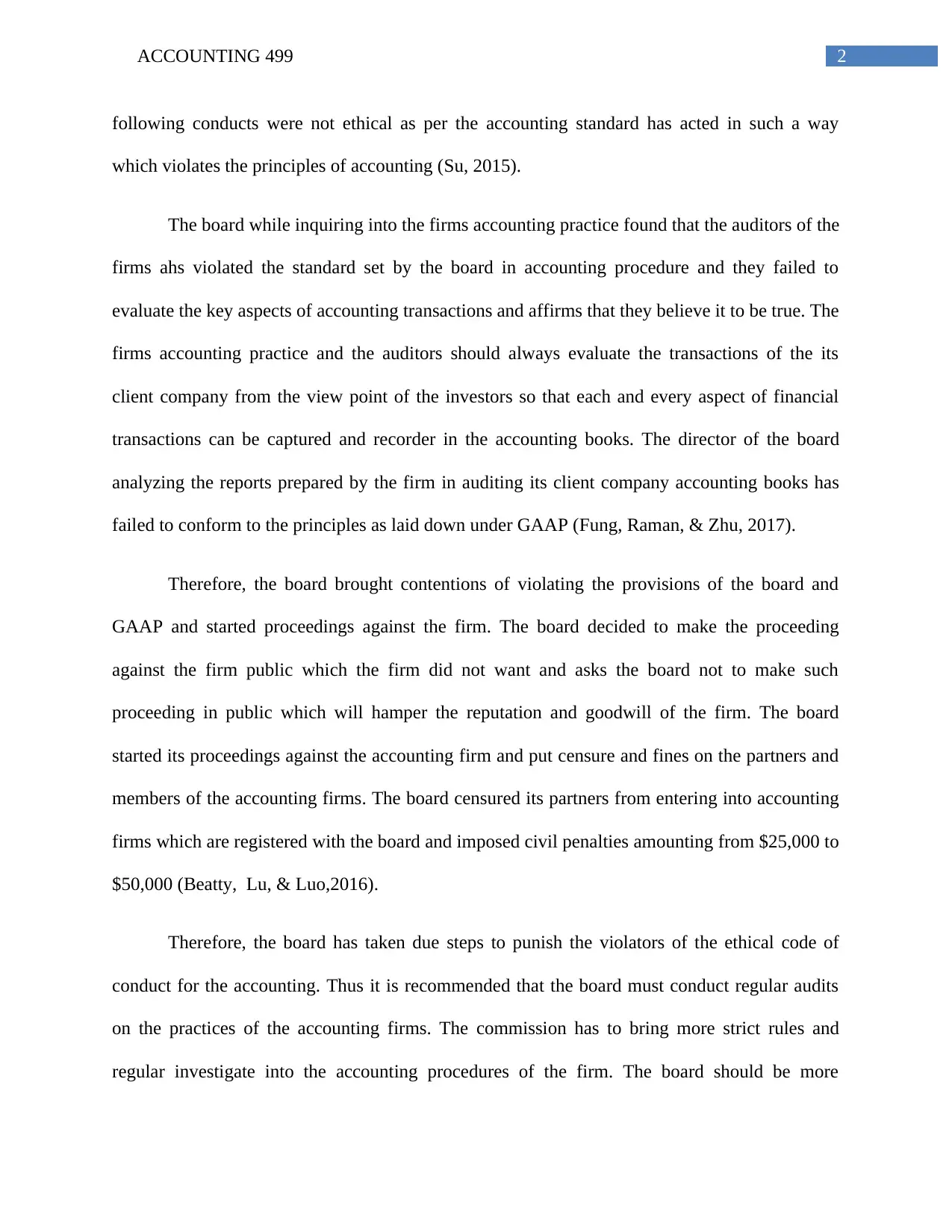
2ACCOUNTING 499
following conducts were not ethical as per the accounting standard has acted in such a way
which violates the principles of accounting (Su, 2015).
The board while inquiring into the firms accounting practice found that the auditors of the
firms ahs violated the standard set by the board in accounting procedure and they failed to
evaluate the key aspects of accounting transactions and affirms that they believe it to be true. The
firms accounting practice and the auditors should always evaluate the transactions of the its
client company from the view point of the investors so that each and every aspect of financial
transactions can be captured and recorder in the accounting books. The director of the board
analyzing the reports prepared by the firm in auditing its client company accounting books has
failed to conform to the principles as laid down under GAAP (Fung, Raman, & Zhu, 2017).
Therefore, the board brought contentions of violating the provisions of the board and
GAAP and started proceedings against the firm. The board decided to make the proceeding
against the firm public which the firm did not want and asks the board not to make such
proceeding in public which will hamper the reputation and goodwill of the firm. The board
started its proceedings against the accounting firm and put censure and fines on the partners and
members of the accounting firms. The board censured its partners from entering into accounting
firms which are registered with the board and imposed civil penalties amounting from $25,000 to
$50,000 (Beatty, Lu, & Luo,2016).
Therefore, the board has taken due steps to punish the violators of the ethical code of
conduct for the accounting. Thus it is recommended that the board must conduct regular audits
on the practices of the accounting firms. The commission has to bring more strict rules and
regular investigate into the accounting procedures of the firm. The board should be more
following conducts were not ethical as per the accounting standard has acted in such a way
which violates the principles of accounting (Su, 2015).
The board while inquiring into the firms accounting practice found that the auditors of the
firms ahs violated the standard set by the board in accounting procedure and they failed to
evaluate the key aspects of accounting transactions and affirms that they believe it to be true. The
firms accounting practice and the auditors should always evaluate the transactions of the its
client company from the view point of the investors so that each and every aspect of financial
transactions can be captured and recorder in the accounting books. The director of the board
analyzing the reports prepared by the firm in auditing its client company accounting books has
failed to conform to the principles as laid down under GAAP (Fung, Raman, & Zhu, 2017).
Therefore, the board brought contentions of violating the provisions of the board and
GAAP and started proceedings against the firm. The board decided to make the proceeding
against the firm public which the firm did not want and asks the board not to make such
proceeding in public which will hamper the reputation and goodwill of the firm. The board
started its proceedings against the accounting firm and put censure and fines on the partners and
members of the accounting firms. The board censured its partners from entering into accounting
firms which are registered with the board and imposed civil penalties amounting from $25,000 to
$50,000 (Beatty, Lu, & Luo,2016).
Therefore, the board has taken due steps to punish the violators of the ethical code of
conduct for the accounting. Thus it is recommended that the board must conduct regular audits
on the practices of the accounting firms. The commission has to bring more strict rules and
regular investigate into the accounting procedures of the firm. The board should be more
⊘ This is a preview!⊘
Do you want full access?
Subscribe today to unlock all pages.

Trusted by 1+ million students worldwide
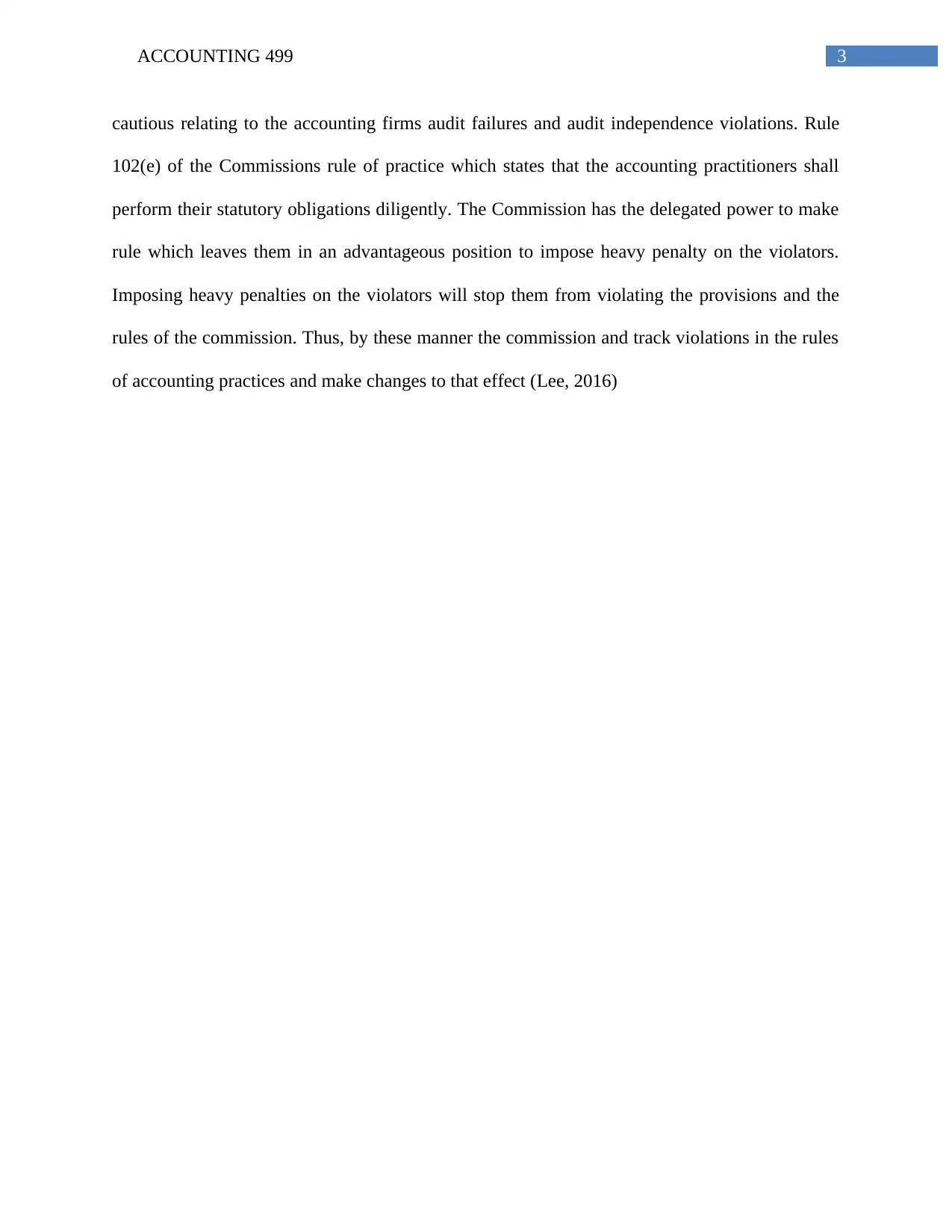
3ACCOUNTING 499
cautious relating to the accounting firms audit failures and audit independence violations. Rule
102(e) of the Commissions rule of practice which states that the accounting practitioners shall
perform their statutory obligations diligently. The Commission has the delegated power to make
rule which leaves them in an advantageous position to impose heavy penalty on the violators.
Imposing heavy penalties on the violators will stop them from violating the provisions and the
rules of the commission. Thus, by these manner the commission and track violations in the rules
of accounting practices and make changes to that effect (Lee, 2016)
cautious relating to the accounting firms audit failures and audit independence violations. Rule
102(e) of the Commissions rule of practice which states that the accounting practitioners shall
perform their statutory obligations diligently. The Commission has the delegated power to make
rule which leaves them in an advantageous position to impose heavy penalty on the violators.
Imposing heavy penalties on the violators will stop them from violating the provisions and the
rules of the commission. Thus, by these manner the commission and track violations in the rules
of accounting practices and make changes to that effect (Lee, 2016)
Paraphrase This Document
Need a fresh take? Get an instant paraphrase of this document with our AI Paraphraser
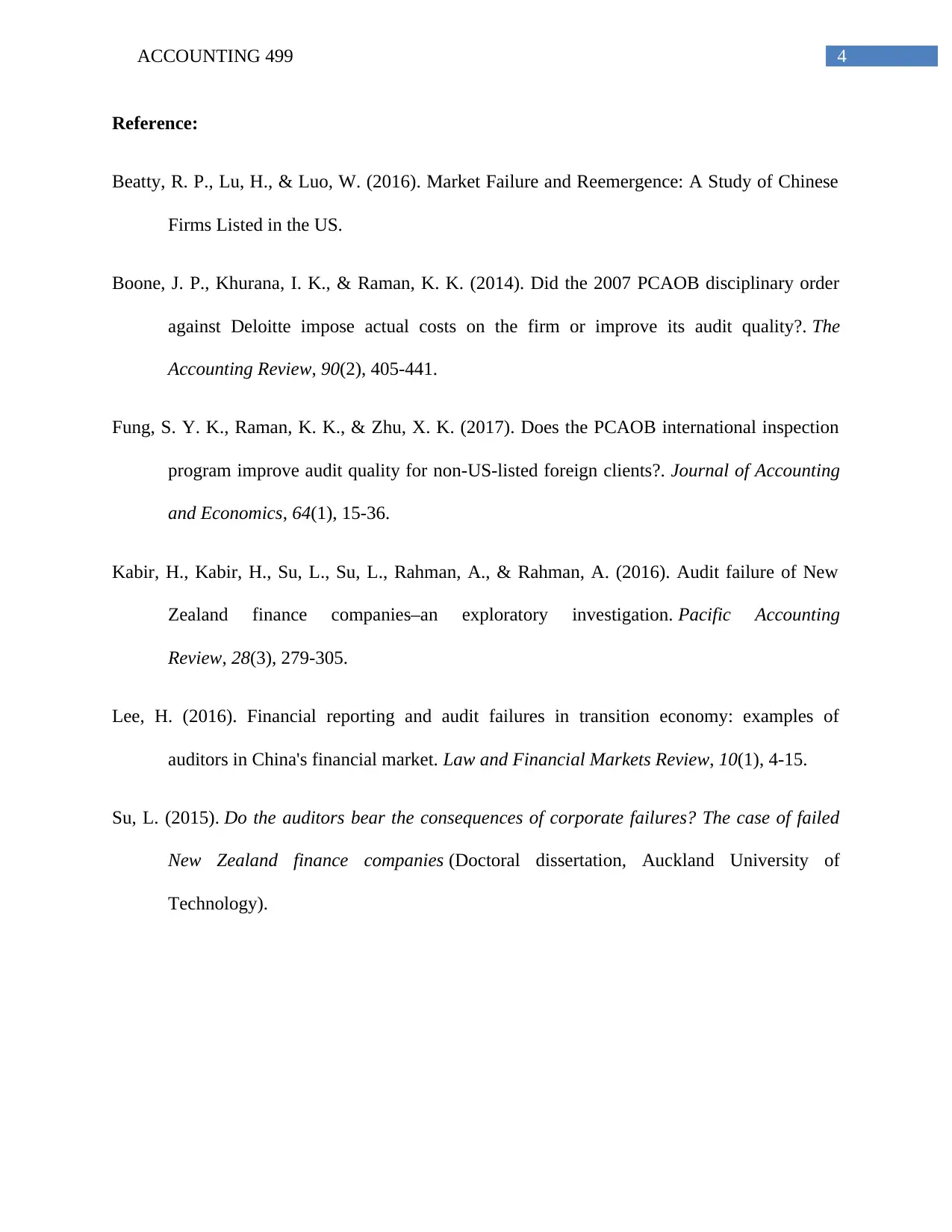
4ACCOUNTING 499
Reference:
Beatty, R. P., Lu, H., & Luo, W. (2016). Market Failure and Reemergence: A Study of Chinese
Firms Listed in the US.
Boone, J. P., Khurana, I. K., & Raman, K. K. (2014). Did the 2007 PCAOB disciplinary order
against Deloitte impose actual costs on the firm or improve its audit quality?. The
Accounting Review, 90(2), 405-441.
Fung, S. Y. K., Raman, K. K., & Zhu, X. K. (2017). Does the PCAOB international inspection
program improve audit quality for non-US-listed foreign clients?. Journal of Accounting
and Economics, 64(1), 15-36.
Kabir, H., Kabir, H., Su, L., Su, L., Rahman, A., & Rahman, A. (2016). Audit failure of New
Zealand finance companies–an exploratory investigation. Pacific Accounting
Review, 28(3), 279-305.
Lee, H. (2016). Financial reporting and audit failures in transition economy: examples of
auditors in China's financial market. Law and Financial Markets Review, 10(1), 4-15.
Su, L. (2015). Do the auditors bear the consequences of corporate failures? The case of failed
New Zealand finance companies (Doctoral dissertation, Auckland University of
Technology).
Reference:
Beatty, R. P., Lu, H., & Luo, W. (2016). Market Failure and Reemergence: A Study of Chinese
Firms Listed in the US.
Boone, J. P., Khurana, I. K., & Raman, K. K. (2014). Did the 2007 PCAOB disciplinary order
against Deloitte impose actual costs on the firm or improve its audit quality?. The
Accounting Review, 90(2), 405-441.
Fung, S. Y. K., Raman, K. K., & Zhu, X. K. (2017). Does the PCAOB international inspection
program improve audit quality for non-US-listed foreign clients?. Journal of Accounting
and Economics, 64(1), 15-36.
Kabir, H., Kabir, H., Su, L., Su, L., Rahman, A., & Rahman, A. (2016). Audit failure of New
Zealand finance companies–an exploratory investigation. Pacific Accounting
Review, 28(3), 279-305.
Lee, H. (2016). Financial reporting and audit failures in transition economy: examples of
auditors in China's financial market. Law and Financial Markets Review, 10(1), 4-15.
Su, L. (2015). Do the auditors bear the consequences of corporate failures? The case of failed
New Zealand finance companies (Doctoral dissertation, Auckland University of
Technology).
1 out of 5
Related Documents
Your All-in-One AI-Powered Toolkit for Academic Success.
+13062052269
info@desklib.com
Available 24*7 on WhatsApp / Email
![[object Object]](/_next/static/media/star-bottom.7253800d.svg)
Unlock your academic potential
Copyright © 2020–2025 A2Z Services. All Rights Reserved. Developed and managed by ZUCOL.




